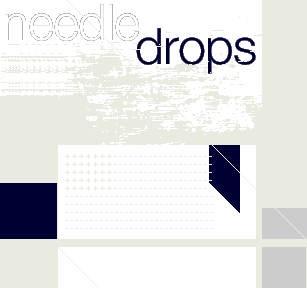


++ Contact Philip Sherburne ++
++ Recently ++
Tuesday, November 29, 2005 = The Stooges Unearthed (Again)
Tuesday, November 8, 2005 = Documenting Beulah And DCFC
Tuesday, November 1, 2005 = Out-Of-Control Rock 'N' Roll Is Alive And Well
Tuesday, October 25, 2005 = Just In Time For Halloween
Monday, October 3, 2005 = The Dandyesque Raunch Of Louis XI
Monday, August 15, 2005 = The Empire Blues
Tuesday, August 9, 2005 = David Howie's Sónar Diary
Monday, July 25, 2005 = Hot Sounds For Summertime
Monday, June 27, 2005 = Overcoming Writer's Block At Sónar 2005
Monday, June 4, 2005 = Cool New Sounds To Download Or Stream
++ Needle Drops Archives ++
View full list of Needle Drops articles...
|
|
 |
Friday, March 14, 2003
++ Breakbeat Essays: Hip-Hop's Forays From The Fold, Part Two
++ There's no one way to mention all the electronic labels venturing into hip-hop — nor the hip-hop labels reincorporating electronics. Warp, one of electronica's most influential labels, in some sense set the standard for the combination of the two styles. For years the imprint gave respect to hip-hop (even without releasing rap music per se), and finally released a proper hip-hop album with Anti-Pop Consortium's The Ends Against the Middle in 2001. At the same time, Warp helped launch the Lex label to showcase an even broader range of hip-hop, from the abstract psychedelia of Boom Bip to the sample-heavy mashup styles of Dangermouse.
Lex's output has been fairly traditional of late — Tes's x2 is a minimalist slab of dark, grinding production and rambling, singsong flow — but it's also released stranger fare, like Kid Acne with Req, or Anticon's Dose One and Jel, or even Boom Bip's sultry remix of Jamie Lidell's "Daddy's Car," a sexed-up R&B song about fucking in the back seat. And yet even Lex is moving away from the Warp model, said label director Tom Brown. "I'd like Lex to be as musically diverse as Warp is, and it's great that there's some common ground at the moment, but I think that Warp's and Lex's orbits are just close together at the moment, and ultimately the two labels will seem quite distinct."
More strikingly, Brown said, "I think that even Lex's perception as a hip-hop label might fade — Boom Bip and Subtle, for instance, are so far from 'boom-bap' in the music they make... that calling it hip-hop is pretty misleading."
Los Angeles' Mush Records — home to the Anticon-related project cLOUDEAD, along with experimental hip-hop from Boom Bip and DoseOne, strange indietronica from Busdriver and Radioinactive with Daedelus, and even traditional downtempo from Fat Jon the Ample Soul Physician, is another label that willfully takes the risk of outpacing hip-hop altogether, marking out its territory smack dab in the netherzone between the genres of hip-hop, electronics and rock. Mush's proprietor Robert Curcio said that the label was founded specifically to explore and exploit the intersections between styles. "Maybe we're more along the lines of some of the European labels," Curcio mused. "A lot of the other U.S. labels come at it from one particular direction, but we build the label to sit in the middle. When we sign a new artist, we sit down, draw three intersecting circles, and explain that Mush sits at the point where they overlap."
++ What's most interesting, perhaps is the way that this approach may be affecting the artists themselves. "I think that the people we're working with — Daedelus, Busdriver, Neotropic — what I'm finding today that I didn't find two years ago is how much those people are listening to music outside the genre they come from," Curcio said. "We knew we were going to be in the middle, but none of the artists did. Two years ago, DoseOne was only listening to hip-hop. Two years later, all he's playing is the Notwist, the Sea and Cake... Neotropic is listening to Cannibal Ox. That willingness by artists who know they're in the middle ground to take on influences outside of what they grew up with is definitely coming through in their music."
The indie visionaries, it seems, are building their legacy by maintaining a safe distance from each other. Chocolate Industries' Seven concurs, finding solidarity with those labels that don't claim any particular sound. "The way I look at hip-hop is different than the way most people do, but I see eye to eye with a handful of people — labels like Quannum, Def Jux, Ninja Tune. You feel like there's some kind of alignment here, even though they all sound different."
What they share, Seven said, is less a particularly underground sensibility than a collective desire to advance the possibilities of hip-hop while even many independent labels are stuck in a pattern of trying to replicate the sound of the early-'90s Native Tongues movement. "New trails always need to be blazed. The Native Tongues blazed a trail that you still feel today. There are people like J-Live, and there are always people reviving the spirit of the good old days, and trust me, we are too, but we're trying to make 2003 the good old days."
One label that will leave a legacy in the first part of the 21st Century is Definitive Jux, which in a few short years has released instant classics from El-P, Cannibal Ox, Aesop Rock, RJD2 and more. Definitive Jux has emerged as the strongest label in independent hip-hop because of its double focus: brilliant lyricists and brash, experimental production are of equal importance. The lesson is not being lost on upstart young labels. Sound-Ink (which recently put out King Honey's startling "Trinity" and last year released the well-regarded Collapsus compilation, featuring veteran MCs like Divine Styler and Anti-Pop's M Sayyid, and experimental producers like John Tejada, Timeblind and DJ Mutamassik) takes Def Jux's "success story" as a model and an inspiration, said cofounder Alex Threadgold, who's looking to the overlooked talent MF Doom to help the label make its name.
As Zevlove X, MF Doom was a part of the controversial group KMD, dropped from its label after releasing the confrontational album Black Bastards. "Doom had disappeared with all the drama," Threadgold said. Sound-Ink cofounder Max Bill rediscovered the artist in Philadelphia and convinced him to record for the label, rapping over production from Max Bill, Heat Sensor, King Honey and even RJD2. "I really believe that what we've done is a special thing," Threadgold said of the record, due to drop this spring. "It's a story album, a concept album. He's done dope singles before, but his solo album wasn't so great. As a lyricist he's a genius, though: it's like a parody of the history of hip-hop, where there's always this narrative underpinning it. Doom plays the record industry's villain, totally maligned. The mask represents him trying to hide himself" as he goes about his attacks on the industry.
++ There are few places to hide, though, in the world of hip-hop, which might be why so much interesting music is taking a detour through electronica. Like Seven, Threadgold identifies the conservative aspect behind so much indie, undie rap. "In the hip-hop pantheon, the Native Tongues of the early '90s became a kind of orthodoxy: it rewrote the history of hip-hop as being this jazz revisitation. Everything was a blues loop. But if you look back at hip-hop's origins, that wasn't the case. But they pulled the illusion off. So in the second wave, of the Native Tongues, with Rawkus, Mos Def and that conscious movement, people thought that's what hip-hop had always been. There was a massive glut of indie releases that ended up hurting the underground." The result was that the major labels were soon releasing more adventurous music than the independents.
"The challenge as an independent label is, can you measure up to the Timbalands," Threadgold said. They hope that with unconventional production drawing as much from Rammellzee as from Autechre, they will.
++ Although there's no single style in the new terrain of electronics-infused hip-hop, one tendency does dominate: the immersive surround-sound of classic Bomb Squad productions, a "wall of sound" for the hip-hop era. In Anticon and Mush Records' worlds, this often translates into a kind of ambient psychedelia. But one of the most distinctive new voices in the field, Scott Herren, almost recalls My Bloody Valentine in the way he patches together dozens of samples into a buzzing plane of sound. His 2001 album as Prefuse 73, Vocal Studies and Uprock Narratives, left some people wondering if it was really a hip-hop record for the way he smoothed out his breaks and filled in the spaces. But One Word Extinguisher, also released by Warp, answers the question in the affirmative. The beats are rougher: like RJD2, Herren prefers beats so raw their knuckles are bloody. But at the same time, the sound is even denser, with vocal choruses chopped up as finely as Akufen's radio cuts, and woven together into a porous blanket. Up and coming MC Diverse guests on one track, but Herren doesn't need the song format to feel comfortable: he experiments with one-minute interludes and stretches out into five-minute instrumentals that have all the poignancy of pure pop. Perhaps its most striking achievement is the way it combines hip-hop's restless range with electronica's legacy: a sonic fullness that's utterly engrossing at each moment, and almost heartbreaking in its continual deferment of resolution.
For Herren, One Word Extinguisher represents not only a break from the previous record's sound, but also from Herren's own increasingly imitated style of editing. "From the first song, I tried to pick up where the last record left off," he said. "To do the vocal chops thing, and then stop it and say goodbye to it. To make a point of saying that's it, I'm moving on, here's the album." There's an implicit message to would-be followers, Herren said. "You can keep doing this shit on your own, don't bite me, but whatever."
While Lex may be moving away from the textbook definition of hip-hop, Herren is adamant that his music be recognized as a contribution to the genre, however unorthodox the sound. With N*E*R*D's funk-rock being cited as one of the most important hip-hop developments of the past few years, Herren's claim seems reasonable. "What I tell most people, when they ask something like, 'Is it glitch-hop?'" Herren warned, "I'm like, check it out. If you want to talk about Def Jux and what I do, if you want to call it 'prog-hop' or 'click-hop' or whatever, you're absolutely wrong. [What we're doing] is actually what's left. It's the last blood of hip-hop, the last bit of sincerity or energy coming from the heart into hip-hop, because the rest is just product."
Part of his intention is to return the innovative spirit of hip-hop's founding producers. When Herren's first record was released, he said, he felt like he was "under a microscope," with listeners and critics dissecting every one of his techniques to determine whether or not it fit the genre's parameters. "I'm like, 'Did you listen?'" he said, exasperated. "Do you understand that in the '80s, this was already done? All the vocal chops and editing — this has been done, I'm just taking it somewhere new."
And so the genre mutates, one edit at a time. Given the density of Herren's productions, it's tempting to return to the metaphor that Mush's Curcio used to describe his label. The sound of hip-hop's future, it seems, will be the scratching of a thousand pencils filling in the overlap in a massive Venn diagram that goes, little by little, pulling more and more spheres into the vortex.
|
| |
|